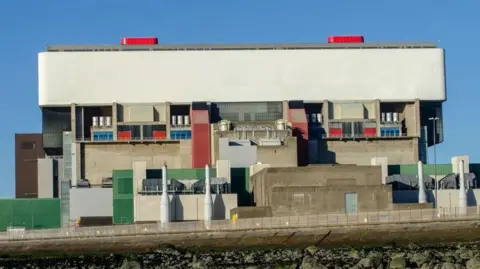Nuclear power plant celebrates energy milestone
 EDF Energy
EDF EnergyA nuclear power station has saved more than 100 million tonnes of carbon dioxide from entering the atmosphere during its lifetime, its operator has said.
Energy firm EDF said it was the equivalent of taking every car off the UK’s roads for almost two years.
Station director Martin Cheetham said it was "a huge milestone" for the plant.
Heysham 2 started generating in 1988 and is due to close in 2028, although that could be extended if the reactors were deemed safe to continue operating, Mr Cheetham said.
'Big part to play'
EDF has owned the site near Morecambe since 2009, with Heysham 1 and Heysham 2 employing more than 1,000 people.
It is the only site in the UK to have two operating nuclear power stations.
Mr Cheetham said: "As we look to the future, the change of government continues the drive for a zero-carbon economy.
"We absolutely fully support that and we hope nuclear's got a big part to play."
He said the benefit of nuclear was its "incredibly small footprint", with the Morecambe site being less than a square mile and "it could have powered every home in Lancashire for 147 years with the energy it's produced".
"Wind and solar absolutely have a part to play, as do batteries, but when the wind's not blowing, the sun's not shining, you need something to keep the lights on, he said.
"Nuclear is perfectly placed to achieve that in a zero-carbon way."
What is nuclear power?
Nuclear power is a way of generating energy to provide electricity.
Because the process doesn't need fossil fuels such as coal, oil or gas, it doesn't release harmful gases into the environment.
It is classed as low-carbon because power stations do not directly release greenhouse gases during their operation.
But it is controversial as it produces nuclear waste, which is very dangerous and needs to be stored and disposed of properly.
Listen to the best of BBC Radio Lancashire on Sounds and follow BBC Lancashire on Facebook, X and Instagram. You can also send story ideas to [email protected]
